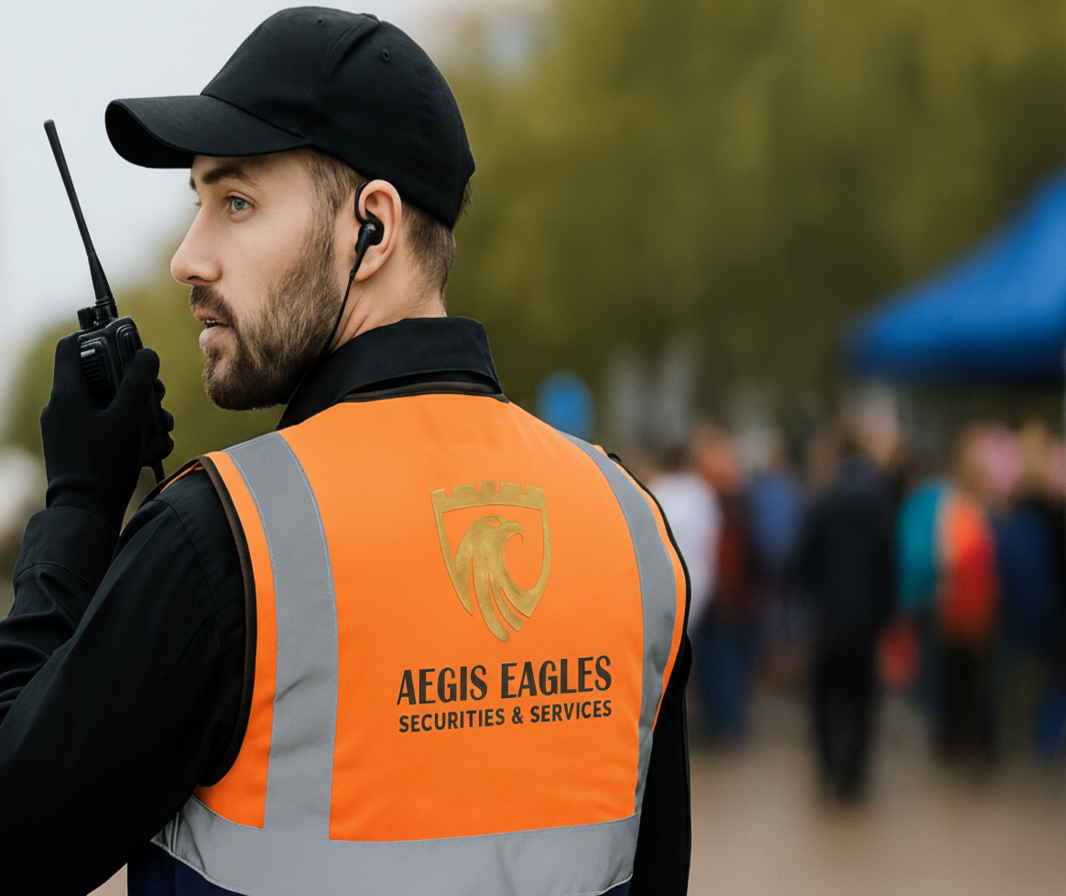Organising an event—whether a corporate conference, public festival, or private function—requires precision, planning, and protection.
At AEGIS EAGLES Securities & Services, we know that event security in the UK is about more than physical presence; it’s about continuous risk monitoring, early detection, and rapid response.
This guide explains how to manage event risk monitoring effectively—step by step.
🔍 Why Risk Monitoring Matters in Event Security
“Monitoring is not just about spotting what’s happening—it’s about being one step ahead.”
Risk monitoring enables event organisers to detect, assess, and respond to threats before they escalate.
According to UK Government Security Guidance, protective monitoring involves systems that identify suspicious activity and trigger fast, appropriate action.
🧠 Benefits of Risk Monitoring:
- Safeguards attendees, staff, and property
- Prevents damage to brand and reputation
- Ensures compliance with UK safety regulations
Legal frameworks such as the Health & Safety at Work Act 1974 and Terrorism (Protection of Premises) Act 2025 (Martyn’s Law) make this vital for UK venues.
✅ Step-by-Step Guide: Managing Risk Monitoring for Events
1. Identify Assets and Risks
List what you need to protect: people, equipment, vehicles, entrances, and data systems.
Apply the risk management cycle: Identify → Assess → Treat → Record → Review.
“The first duty of event security is to understand what must be protected—and why.”
2. Assess Risk Levels
Evaluate each threat’s likelihood and impact—such as crowd surges, unauthorised entry, or vehicle attacks.
Rank and prioritise risks so that high-impact threats are handled first.
3. Implement Monitoring and Control Systems
Deploy real-time systems that help detect and control incidents:
- SIA-licensed guards for patrols and incident response
- CCTV and access control systems for live tracking
- Event control room for coordination and communication
- Two-way radios or mobile devices for instant updates
4. Respond Quickly and Effectively
When an alert is raised:
- Isolate affected areas
- Secure people and valuables
- Contact emergency services if needed
- Follow safe evacuation routes
“A good response isn’t just what you do—it’s how fast and how well you coordinate the team.”
5. Record, Review, and Improve
Maintain detailed incident logs—record what occurred, what actions were taken, and what outcomes followed.
Hold a post-event review meeting to refine your next plan and strengthen preventive measures.
🧭 Best Practices for UK Event Risk Monitoring
- ✅ Comply with UK security laws (HSE, SIA, Martyn’s Law)
- ✅ Hire SIA-licensed personnel—required for professional guarding
- ✅ Tailor the monitoring plan to the event’s type and scale
- ✅ Use layered security: guards + technology + communication
- ✅ Keep monitoring visible but discreet to ensure guest comfort
📋 Event Security Monitoring Checklist
☑️ Pre-event briefing completed
☑️ Control room operational
☑️ CCTV & access control active
☑️ Patrol schedule logged
☑️ Incident response plan ready
☑️ Real-time logging enabled
☑️ Post-event debrief scheduled
📝 Final Thoughts
Event risk monitoring is not a luxury—it’s a requirement.
A successful event depends on how effectively risks are identified, monitored, and managed.
At AEGIS EAGLES Securities & Services, we provide comprehensive UK event security solutions backed by experience, compliance, and real-time readiness.
Whether you’re hosting a small corporate meeting or a large public gathering, trust AEGIS EAGLES to deliver professional, proactive, and compliant protection.

